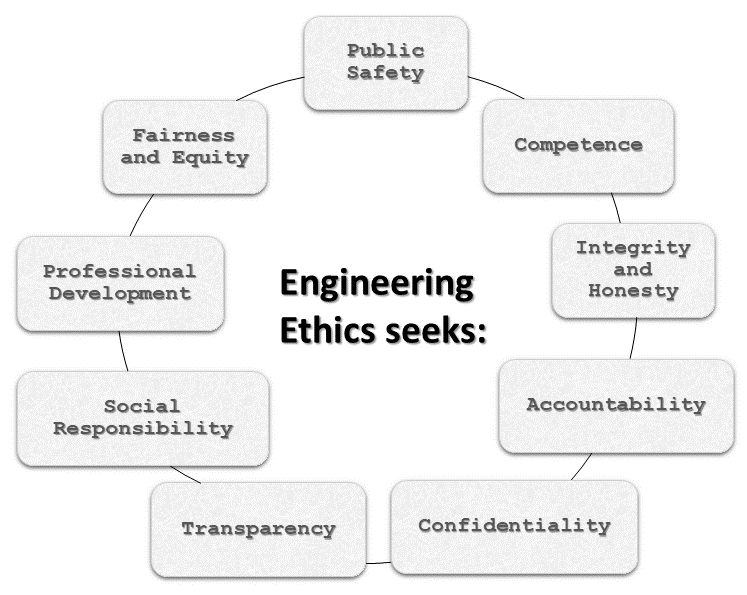imkoy
back to the index
6. Engineering Ethics
Engineering ethics is the field of moral principles that apply to the practice of engineering, referring to the standards to which all engineers are held accountable. Like any other profession, engineers need guidelines and standards to help them conduct themselves ethically in their work. Following strict rules and guidelines ensures that all engineering projects are safe and of high quality.
As presented bellow:

Different organizations have established different code of ethics as part of a Professional Engineers license. In a Professional Engineer license a engineer vows to protect public safety, prioritize the interests of clients and employers over their own, and conduct themselves honestly and ethically at all times. They are not regulations or rules, but play a role in fostering public trust in the profession. This trust enables engineers to innovate and develop new technologies that advance modern society while ensuring public trust and maintaining professional standards. The code serves as a social contract, guaranteeing that designs are prepared by professionals who put the public interests first.
The American Society of Civil Engineers (ASCE) suggests that to uphold these principles, engineers are expected to adhere to several key ethical guidelines, including the following:
- Engineers shall perform services only in areas of their competence.
- Engineers shall issue public statements only in an objective and truthful manner.
- Engineers shall act as faithful agents or trustees for each employer or client, avoiding conflicts of interest.
- Engineers shall continue their professional development throughout their careers and provide opportunities for others under their supervision.
- Hold paramount the safety, health, and welfare of the public.
- Perform services only in areas of their competence.
- Issue public statements only in an objective and truthful manner.
- Act for each employer or client as faithful agents or trustees.
- Conduct themselves honorably, responsibly, ethically, and lawfully to enhance the profession honor, reputation, and usefulness.
6.1. The Role of Ethics in Engineering: Upholding Public Safety, Integrity, and Trust
Engineers often work on projects that impact society, frequently building structures people rely on daily. Therefore, adhering to a code of ethics is essential to ensure that they act in the public best interest, prioritizing safety and following established procedures and standards. Integrity and honesty are crucial for engineers, as they must take responsibility for their actions and be transparent with clients, even under pressure. A code of ethics helps guide engineers to make sound decisions, upholding professionalism and prioritizing client interests. These codes also foster public trust, reassuring society that engineers will act ethically, even when not under scrutiny. Moreover, engineering ethics ensure that personal information is kept confidential, protecting clients and employers. In situations where tough decisions are required, the code helps engineers choose actions that benefit the public, such as advocating for the use of better materials, even at higher costs, to maintain public safety.
6.2. Closing
Ethical responsibility is at the core of the engineering profession, as engineers work shapes the urban environment and influences how people interact with the world. Ethical standards require engineers to prioritize the public best interests, ensuring public safety, community health, and welfare. By adhering to ethical guidelines, engineers protect the legitimacy of the profession and uphold its integrity and high standards.
Engineering ethics is serious business as its commitment to its code forms the foundation for public trust and confidence in the engineering profession.
References
PDH Pro. (2025, February 18). Engineering Code of Ethics, Ethics in Engineering. https://pdh-pro.com/pe-resources/engineering-code-of-ethics/
Surveyors, M. E. &. (2022, July 13). The importance of ethics in engineering. MFS Engineering. https://www.mfsengineers.com/news/2022/the-importance-of-ethics-in-engineering
Wikipedia contributors. (2024, December 7). Engineering ethics. Wikipedia. https://en.wikipedia.org/wiki/Engineering_ethics
Williams, L., & Williams, L. (2024, September 10). Ethics for Engineers: Staying compliant & Why it matters. Vector Solutions. https://www.vectorsolutions.com/resources/blogs/ethics-for-engineers-staying-compliant-why-it-matters/
Two historic failures of ethics in engineering. (2001, March 12). CWRU Online Engineering. https://online-engineering.case.edu/blog/two-historic-failures-of-ethics-in-engineering
Post date: 2025-02-23
Last edit: 2025-03-15